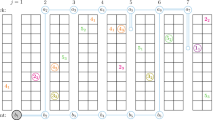Abstract
In this paper a main point of view is the exhausting of capacity in relation to a capacity focus at every node of the production graph. This exhausting process has a local and a global aspect. Optimality means a homogeneous reservation of the production nets and exhaustion of the capacity in the nodes close to the focus. Under weak conditions an optimal production sequence is achievable constructively. A classical field of application of this result is the assembly, but many other applications are possible.
Zusammenfassung
In dieser Arbeit ist die Ausschöpfung von Kapazität relativ zu einem Kapazitätsfokus in den Knoten des Produktionsgraphen ein Hauptaspekt. Dieser Ausschöpfungsprozeß ist globaler und lokaler Natur. Optimalität bedeutet homogene Belegung der Produktionsnetze und die Ausschöpfung der Kapazität in den Knoten dicht um den Focus. Unter schwachen Voraussetzungen ist eine optimale Produktionsfolge konstruierbar. Ein klassisches Anwendungsgebiet ist die Montage, aber viele andere Anwendungen sind möglich.
Similar content being viewed by others
References
Bennett, D. J., Rajput, S. K.: Design and implementation of production systems for high variety electronics assembly. Int. J. Powder Metall.9, 39–46 (1989).
Brucker, P.: Anmerkungen zu heuristischen Verfahren. Proc. Oper. Res.6, 668–676 (1976) (DGOR, Paper of the Annual Meeting 1976).
Brucker, P.: Scheduling. Wiesbaden: Akademische Verlagsgesellschaft Wiesbaden 1981.
Brucker, P.: Complexity results for shop problems. Mathematical programming, Proceedings of the International Congress, Rio de Janeiro 1981, pp. 43–52.
Chang, Yih-Long, Matsuo, H., Sullivan, R. S.: A bottleneck-based beam search for job scheduling in a flexible manufacturing system. Int. J. Prod. Res.27, 1949–1961 (1989).
Chang, Yih-Long, Sullivan, R. S.: Schedule generation in a dynamic job shop. Int. J. Prod. Res.28, 65–74 (1990).
Conway, R. W., Maxwell, W. L., Miller, L. W.: Theory of scheduling. Don Mills: Addison Wesley 1967.
Hackmann, S. T., Leachman, R. C.: A general framework for modeling production. Manag. Sci.35, 478–495 (1989).
Krause, F. L., Altmann, C.: Arbeitsplanung alternativer Prozesse für flexible Fertigungs-systeme. Z. wirtsch. Fertigung84, 228–232 (1989).
Müller-Merbach, H.: Optimale Reihenfolgen. Berlin Heidelberg New York: Springer 1970.
Chen, W.-K.: Theory of nets: flows in networks. New York: J. Wiley 1990.
Widmer, M., Hertz, A.: A new heuristic method for the flow shop sequencing problem. Eng. J.41, 186–193 (1989).
Author information
Authors and Affiliations
Rights and permissions
About this article
Cite this article
Heuser, W.K. Deterministic job-shop scheduling problems with capacity focus. Computing 51, 1–13 (1993). https://doi.org/10.1007/BF02243825
Received:
Revised:
Issue Date:
DOI: https://doi.org/10.1007/BF02243825



